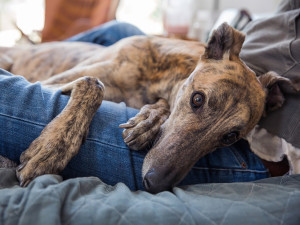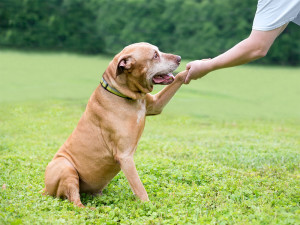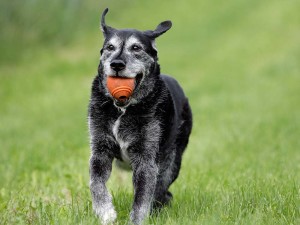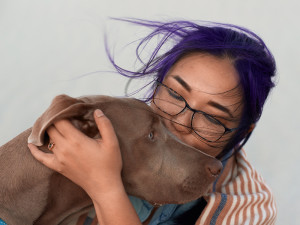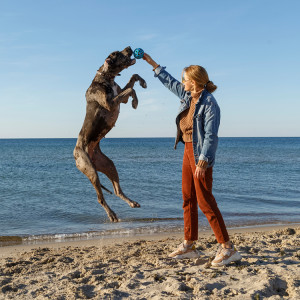Everything You Need to Know to Care For Your Senior Dog
Your older dog is the love of your life. Here are some health issues to look out for.

Share Article
It always happens sooner than you think. You notice your dog developing some distinguished gray whiskers on their face. Maybe they’re starting to have trouble keeping up with the puppies at the dog park or begin letting that afternoon nap extend into the evening. Many subtle changes can make you realize that your pup is getting a little older and may have some new needs and concerns.
Age isn’t a disease, so there’s no reason your dog can’t age as gracefully (or as gorgeously!) as Angela Bassett or Meryl Streep. You can help your senior dog enjoy their golden years by being aware of some common health issues, adjusting their diet and exercise routine, stepping up veterinary care, and keeping their quality of life at the forefront.

Get (totally free) deals for food, treats, accessories, tech, and way more pet parenting must-haves.
opens in a new tabCommon Health Issues in Senior Dogs
Dogs of any age can develop health problems, but some issues become more common as dogs get older. Many causes of senior dogs “slowing down” as they age are actually medical issues. Some of these conditions can be treated or managed to help get that spring back into their step.
Arthritis
Sore, creaky joints will slow any dog down. Musculoskeletal issues or years of wear and tear can affect jointsopens in a new tab and limit mobility. Joint supplements, prescription pain relief medications, and low-impact exercise will often help your elderly dog remain active.
Dental Problems
Dogs aren’t great at brushing their teeth, so pet parents should be. Even with good at-home careopens in a new tab, dogs still need regular dental examinationsopens in a new tab and cleanings to prevent problems or treat damaged teeth. Senior dogs’ teeth have seen more years of chewing, crunching, and gnawing, so they can be more prone to disease.
Cognitive Dysfunction
Cognitive dysfunction syndromeopens in a new tab is the doggie version of Alzheimer’s disease. Gradual deterioration of brain tissue can lead to a variety of behavioral and personality changes. This disease is not reversible, but you may be able to slow progression with diet changes or supplements, drug therapy, and enrichment exercises.
Obesity
It’s common for geriatric dogs to be less active and have a slower metabolism with age. This will reduce the number of calories they need to maintain an ideal body weight, and it can lead to obesityopens in a new tab if their food intake isn’t adjusted. Obesity can make other health problems worse and can lead dogs to be even less active, creating a cycle of weight gain. Weigh your senior dog regularly to make sure they’re not packing on the pounds.
Cancer
Dogs are more likely to develop canceropens in a new tab as they age. Some cancers are very localized tumors and are easily removed. Others can invade deeply into the surrounding area or even spread to distant organs. Routine health checks make it more likely you’ll catch cancer early as your dog goes through their senior years.
Kidney Disease
Dogs are born with way more kidney function than they need to survive. Minor stresses on the kidneys can build up through life, and sometimes the kidneys aren’t able to do their job properly anymore. Chronic kidney diseaseopens in a new tab is not reversible, but there are strategies to help slow the progression of disease and reduce stress on the kidneys.
Vision and Hearing Loss
Degeneration of the eyesopens in a new tab and ears with age is common in both dogs and humans. Some problems that cause sensory loss (like cataracts) can be fixed with surgery. Other problems can’t be reversed and require some simple lifestyle adjustments. Dogs with poor — or even no — hearing or vision can be perfectly happy, but they may not adjust to environment or routine changes as quickly as younger dogs.
Incontinence
Elderly dogs with other health issues, such as diabetesopens in a new tab, arthritis, neurologic problems, and kidney disease may have trouble getting outside as easily or as frequently as they used to. This can lead to some frustrating mishaps indoors. Accidents in the house can also be due to confusion in dogs with cognitive dysfunction syndrome. Dogs with continence issues may need to go out more frequently or may need to be trained to go on a potty pad if that’s not possible.
Heart Disease
Heart murmurs and irregular heart rhythms develop more commonly in older dogs. These can often be detected on routine vet exams and treated with medications. Some breeds are predisposed to certain heart problems and require more frequent examinations or in-depth screening.
Seizures
Unfortunately, many geriatric dogs develop seizuresopens in a new tab because of a tumor in or near their brain. While there are many other possible causes for seizures, this is the primary concern in dogs who have seizures for the first time when they are older. Seizures can often be controlled for a good bit of time with long-acting anti-seizure medications.
Adjusting Your Dog’s Diet and Exercise Routine
Dogs have changing dietary needs as they age. For dogs who are otherwise healthy, it may be best to switch to a senior dog food when they are five to seven years old (depending on their size). Talk to your veterinarian about diet recommendations and when it may be time to consider making a change. Always transition to a new diet gradually over a period of about a week, even if it’s the same brand.
Some dogs remain spry and active through their entire life, but most will gradually become less eager to run and more interested in prolonged snuggle time. Encouraging activity as your dog ages can help reduce problems with arthritis and obesity. Watch your dog closely during playtime, and make sure they’re not overdoing it. Remember, old dogs can learn new tricksopens in a new tab. Mental stimulation is important and can help keep a dog’s mind sharp and reduce the symptoms of cognitive dysfunction, even if they aren’t as physically active as they used to be.
Vet Care and Medication
Every dog’s need for vet care will differ as they age. Dogs without any serious issues may remain on an annual or biannual schedule for check-ups. Dogs with ongoing health issues often need more frequent monitoring and care. Your veterinarian may begin to put increased emphasis on the importance of regular blood work, maintaining an appropriate weight, and at-home dental care to help reduce the chance of a major problem developing.
Just like older people, older dogs will often end up requiring medications to help keep them active and happy. This may be as simple as a joint supplement with breakfast or as complicated as a daily array of heart medications. Most dogs will adjust well to taking medications with time if it’s presented as a positive activity.
End-of-Life Decisions
The hardest part of having a dog as a companion is letting them goopens in a new tab. Some dogs may pass peacefully in their sleep without warning, but most will need their family’s help in recognizing when they’re not enjoying life anymore. Veterinarians and pet parents should work together to focus on maximizing a dog’s quality of life rather than the quantity of life.
There’s rarely a blaring horn telling you it’s time. Changes to quality of life usually happen gradually, and it’s easy to accept an older dog’s current behavior as the new normal, even if it’s not normal. The question about quality of life often boils down to this: Is your dog able to regularly do the things they enjoy doing without pain or distress? If they’re not, it may be time to have a conversation with your veterinarian.
Being aware of possible problems, maintaining your dog’s vet care and appropriate body weight, and recognizing factors affecting their quality of life gives you a great chance of making your dog’s senior years as comfortable and enjoyable as their puppy years.
FAQs
How do you take care of a senior dog?
The biggest factor in taking care of a senior dog is recognizing their changing needs. Familiarize yourself with common health issues and be on the lookout for changes in behavior or activity. Make sure that you’re aware that, while they may not be able to do all the things they used to, they still need love, physical activity, mental stimulation, and comfort.
What do senior dogs need most?
Senior dogs need a parent who is attentive to their situation. While you don’t have to watch over every older dog and worry any time they grunt when laying down, it’s important to make sure that you actively check in with their condition and make adjustments (softer beddingopens in a new tab, rugs on slick floors, and ramps instead of steps) that will address their needs. Discuss scheduling more frequent vet visits to make sure that you’re not missing anything important.
What do senior dogs do all day?
Most older dogs will still want to do the same things they’ve enjoyed throughout their lives. Barring any health conditions that keep them from doing those things, they should still love doing their favorite activities. They may not be able to do them for as long as they used to or may need more time to rest after, but enjoying the things they’ve always loved helps maintain their quality of life.
How do I know if my senior dog is suffering?
Checking on your dog’s quality of life with a questionnaire like Honoring the Bondopens in a new tab from the Veterinary Medical Center at The Ohio State University may help you decide. It can give you an idea of what factors to consider about your senior dog’s quality of life and allow you to track if they’ve worsened or improved over time. You know your dog better than anyone, so you’ll be the most in tune with how they’re feeling.

Dr. Bartley Harrison, DVM
Dr. Bartley Harrison, DVM is a small animal veterinarian based in North Carolina who has practiced emergency medicine since graduating from the Texas A&M College of Veterinary Medicine. His primary interest areas include pain management, cardiology, and the treatment of shock.
He is a member of the Veterinary Emergency and Critical Care Society, American Veterinary Medical Association, and American Medical Writers Association. In addition to his clinical work, he writes pet health articles to help provide accurate information for both new and experienced pet parents. When he’s not working, he enjoys cooking, traveling, reading, and going on adventures with his dog.
Related articles
![Older dog playing with ball in a green field]() opens in a new tab
opens in a new tabDog Arthritis Treatment: How to Relieve Arthritis Pain in Dogs
Tips for treating achy joints — from medications to massages.
![Beagle eating food out of a dog bowl]() opens in a new tab
opens in a new tabSupplements Are Going to the Dogs
An integrative vet helps suss out what’s beneficial versus what’s bogus.
![Sad boxer rests on owners lap, dog doesn't want to be touched]() opens in a new tab
opens in a new tabHow to Tell if Your Dog Is in Pain
And what to do to help them.
![Woman with purple hair kissing the face of her chocolate brown hound dog]() opens in a new tab
opens in a new tab8 Comforting Thoughts to Help You Through the Death of Your Pet
There’s no guidebook to grief and loss — but these kind words will help.
![A woman holding up a ball for her jumping Great Dane dog at the beach]() opens in a new tab
opens in a new tabIt’s Not Bougie to Get Stem Cell Therapy For Your Pets
Gallant CEO Dr. Linda Black on how you can affordably give your dog a long and happy life, thanks to science.
![A woman in a bright yellow-orange sweater holding a striped kitten in one hand and a credit card in the other while using her laptop in front of her]() opens in a new tab
opens in a new tabHow to Get Help With Vet Bills for Dogs Who Need Surgery
Worried about the cost of making your pet feel better? Help is on the way.
